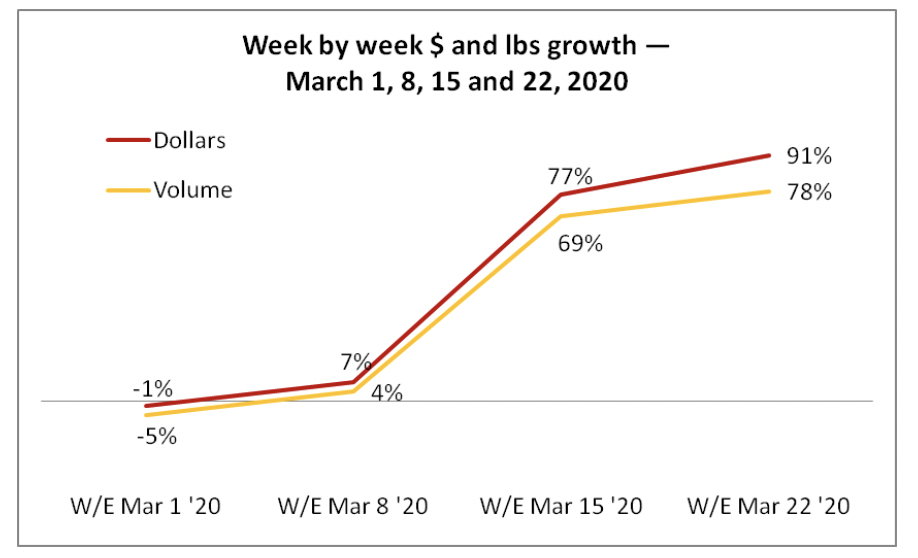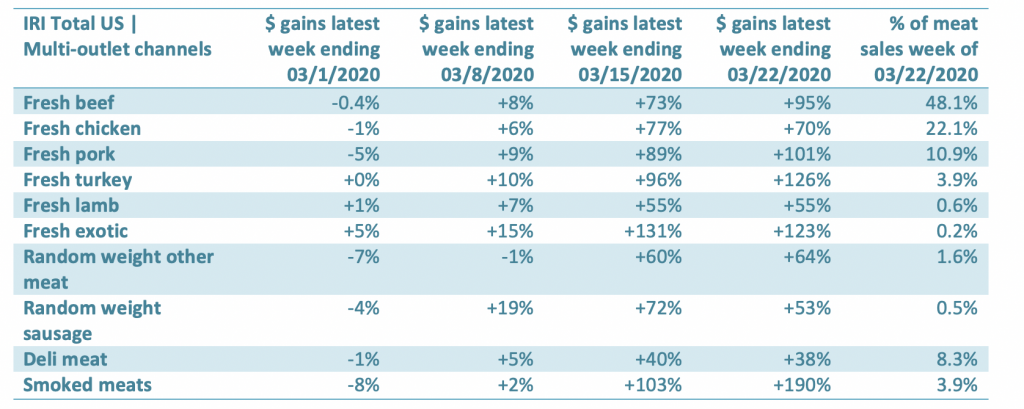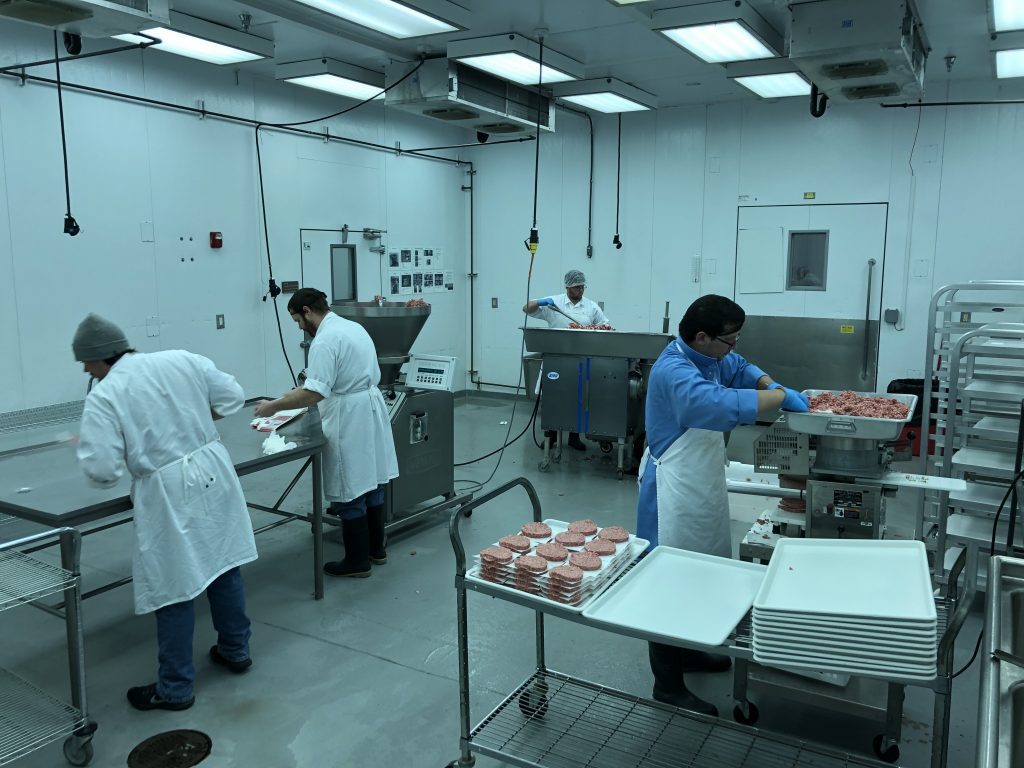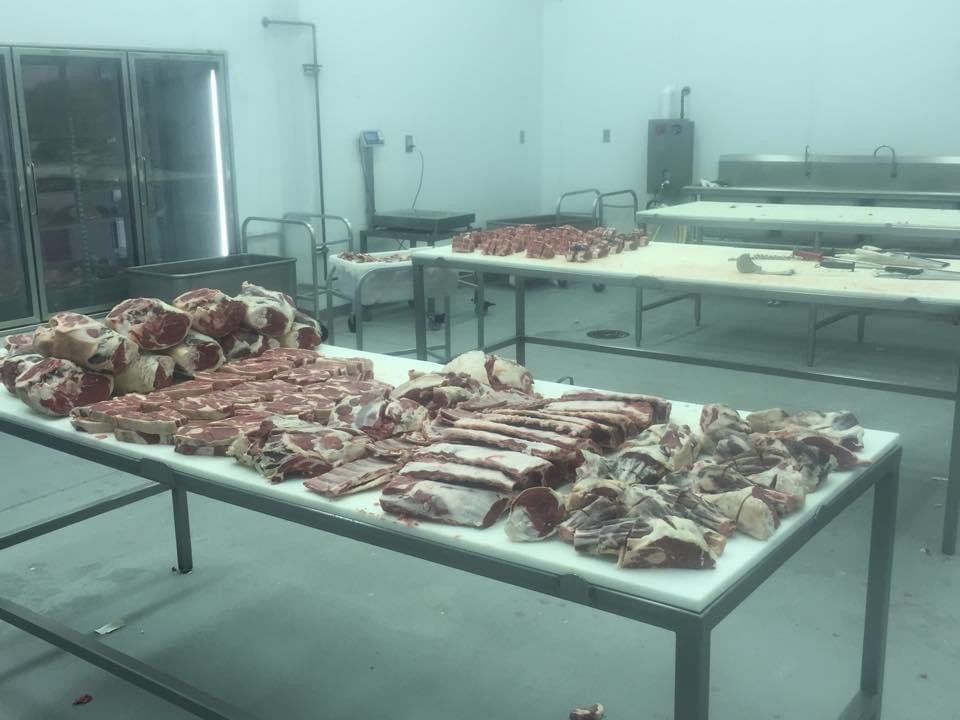The line of people who waited patiently to pick up their beef and pork orders stretched half the length of a football field. Customers spaced themselves out more than six feet apart, practicing social distancing as they waited outside of the University of Georgia’s Meat Science Technology Center for someone to take their credit card, go back inside and return with their meat.
“When someone orders 20 two-pound packages of ground beef, you know, you look at it and you think, yup…they’re worried,” said Ryan Crowe, the Meat Science Technology Center’s lab manager. Listen to Crowe’s response. The store at the center sold 250 pounds of ground beef to more than 90 customers in just two days during the week of March 20. Crowe has seen firsthand the public’s worry about keeping their refrigerators stocked while sheltering in place at home.
During his 22 years working in the meat lab Crowe said he has not seen anything like COVID-19 and the disruption it has caused to the food industry business model.
I mean it’s weird. It’s really weird,” Crowe added.
The numbers illustrate the public’s efforts to stockpile groceries in Georgia and throughout the United States. Beef production estimates are 13.7% higher than a year ago for the week of March 28.
Since the COVIC-19 pandemic erupted, more people are cooking and eating meals at home. The Meat and Demand Monitor survey collects data from 2,000 respondents each month and shows the increase in the number of people now eating beef and pork three times a day.
The survey also illustrates that the surge in meat consumption began March 24 and coincided with government warnings to self-isolate or mandates to shelter in place to help slow the spread of the virus.

Increase In Meat Sales
Sales data compiled by Information Resources, Incorporated (IRi) and 210 Analytics LLC confirm the increase. The table below illustrates 210 Analytics’ Anne-Marie Roerink’s statement that, “meat has been the leading sales driver for the perimeter, up by 91% year over year for the week ending March 22, with volume sales up 78%.”

Consumers are buying more beef and chicken with fresh beef sales generating close to $900 million the week of March 22. That number is virtually double the same period last year.

Supply & Demand Issue
The Food and Agriculture Organization of the United Nations (FAO) writes, “We risk a looming food crisis unless measures are taken fast to protect the most vulnerable, keep global food supply chains alive and mitigate the pandemic’s impacts across the food system.”
Georgia Agriculture Commissioner, Gary Black said that Georgia’s pipeline for food is strong and has an enormous capacity. Listen to Commissioner Black’s response.
This is not a shortage issue. There is plenty of food in the system, but there may be a timing issue, and immediate spot and demand there is no way to anticipate that,” said Commissioner Gary Black.
Roerink agrees and said, “I don’t foresee shortages by any stretch of the imagination. It’s just a matter of retooling and a little bit of a normalized demand over the next couple of weeks.”
But there are other factors during the COVID-19 pandemic that may impact meat supply and demand. It takes time to restock empty grocery store shelves, Black said, and he added that, “a slow down at processing plants could have an impact on keeping store shelves stocked.” He says protecting our food supply operations, the work force and distribution chains is vital while also dealing with COVID-19. Listen to Commissioner Black’s response.
“Georgia agriculture from farm, to all of those who have byproducts, that you and I are able to get at a restaurant or grocery store, that system is as important a component of national security as anything else in our country,” said Commissioner Black adding, “so we are not dependent on the other influences in the world…We surely do not want to be dependent on someone else for our food.”
Black said that means support for local growers and suppliers. Listen to Commissioner Black’s response.
“Supporting local producers is that much more important,” said Commissioner Black.
So important, that U.S. Secretary of Agriculture, a native Georgian and former governor of the state recently called the people who work in the food supply chain, heroes.
When we reached out to Secretary Sonny Perdue for comment a USDA spokesperson responded with an email that stated, “The food supply chain is a critical industry in the United States and Secretary Perdue fully recognizes the need to keep workers and inspectors safe during the COVID-19 national emergency,” adding that the “USDA, together with the FDA and CDC, will continue to support a whole of America approach to ensure the food supply chain remains safe and secure.”

Local Impact of Food Distributors
The University of Georgia’s meat lab serves as a research and extension tool where students learn the production of meat science through animal carcass evaluation. The program then sells the meat they harvest to the local Athens community.
When the coronavirus hit, the shop shut down future harvesting.
“We can’t work anymore. We can’t have carcasses hanging in the cooler, that becomes a problem because now you’ll not know when you’re going to be able to get back to them,” said Crowe.

Students have had to return to their respective homes since UGA’s campus closed closed to all non-essential personnel. This has taken a toll on the employees ability to come in and help keep the store up and running, leaving Crowe a lone wolf, to fill the orders from the community.
“It takes a little bit of time to recover from that amount of business or amount of buying products like that,” said Ryan Crowe. He estimates that the store has enough meat to last at the current rapid selling rate for the next month and a half.
Crowe said “[the community] is just thankful and appreciative that we are doing what we can.”
Although the meat supply remains readily available in Georgia now, that might not be the case in the months or weeks to come. Crowe says states’ various shelter in place regulations could affect national inventory levels.
While I believe the supply is there, and there is a ruling about essential food and agriculture work (meat processing being one of those), there could be some trouble with getting labor at the big packing facilities,” said Ryan Crowe.
The University of Georgia’s Meat Science Technology Center is taking orders throughout the week and has pick up available on Fridays.

Skylar Nicholson is a senior majoring in journalism in the Grady College of Journalism and Mass Communications with an additional major in political science.








Show Comments (0)